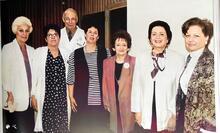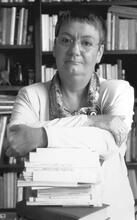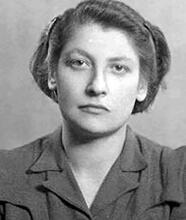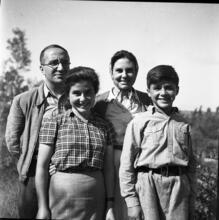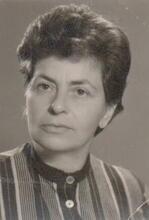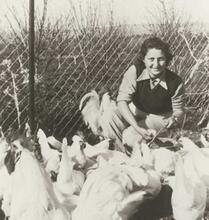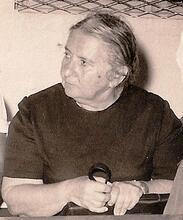Ruth Aliav-Klüger
Ruth Aliav-Klüger was born in Kiev in 1910 to a large family, but her childhood during World War I was characterized by much unrest and brutality and she was separated from her mother and siblings for seven years. In 1930 she married and emigrated to Palestine, where she worked in Foreign Relations for the Histadrut before being recruited in 1938 for the Mosad le-Aliyah Bet, helping thousands of people make aliyah during World War II. Aliav-Klüger also engaged in espionage work in Egypt and helped Holocaust survivors emigrate to Palestine after the war. In the later years of her career, Aliav-Klüger wrote two memoirs and was invited to speak far and wide about her experiences helping others flee persecution.
Early Life
Ruth Aliav-Klüger (née Polisiuk) was born in Kiev, Ukraine (then under Tsarist Russian rule) on April 27, 1910. She was the youngest child in a family of eight. Her father, a horse trader, disappeared before she knew him. While she was visiting her grandmother and her mother’s sisters as a toddler, in a (Yiddish) Small-town Jewish community in Eastern Europe.shtetl near Kamieniec Podolski (Ukraine), the battles of World War I reached their area. The shtetl was occupied and Aliav-Klüger lost contact with her immediate family. The young child and her aunts were forced to leave their home and wander from place to place as refugees. While fleeing, the child witnessed brutal pogroms against Jews, which became deeply engraved in her memory. Seven years later, she was reunited with her mother, brother, and sisters in Czernowitz (until 1918, under Austrian rule and later under Romania). There she attended elementary school and gimnazjum and became a member of the Zionist-socialist Ha-Shomer ha-Za’ir youth movement. After completing high school, she took up the study of law in Vienna, but left before taking the final examinations.
In school and in her travels, she displayed a flair for languages, becoming fluent in Russian, Yiddish, German, Romanian, French, English, Spanish, and Hebrew. She later mastered Portuguese as well.
Work with Mosad le-Aliya Bet
In 1930, she married Emanuel Klüger (from whom she was divorced in 1940) and immigrated to pre-State Palestine. After a year at A voluntary collective community, mainly agricultural, in which there is no private wealth and which is responsible for all the needs of its members and their families.Kibbutz Mishmar ha-Emek, she moved to Tel Aviv and began working in the Foreign Relations Department of the Histadrut Executive. In late 1938, she was recruited by Eliyahu Golomb and Berl Katznelson to serve in the Haganah and its “illegal” immigration branch the Mosad le-Aliya Bet. She was the only woman among the early members of the Mosad, which smuggled Jews out of Europe and into Palestine in an attempt to circumvent the Lit. "ascent." A "calling up" to the Torah during its reading in the synagogue.aliyah restrictions of the British Mandatory authorities.
The Mosad emissaries operated secretly due to government opposition to their activities in the various countries where they were active, and the risk of arrest and trial was always present. Aliav-Klüger was sent to Romania posing as a representative of the Keren Kayemet le-Israel (the Jewish National Fund), in reality engaging in fundraising and establishing contacts for the procurement of ships in which she and her comrades planned to bring out as many Jews as possible. She believed that the lives of Europe’s Jews were in imminent danger and was determined to overcome every obstacle to the success of her mission, aided by her femininity, linguistic facility, resourcefulness, courage and creative imagination. In this way, she managed to persuade senior members of government, officials at various levels, ship owners, and wealthy Jews to enable the Tiger Hill to set sail from Constanta carrying about 1,400 “illegal” immigrants to Palestine. The ship arrived off the shore of Tel Aviv on September 2, 1939. Aliav-Klüger also took part in the Mosad’s failed effort to rescue Jewish refugees from the Kladovo-Sabac transport aboard the ship Darien.
She was forced to leave Romania in late 1940 as a result of the rise in antisemitism and anti-Jewish persecution with the accession of Marshal Ion Antonescu and the Iron Guard. From Istanbul, she returned for a brief period to Palestine where she received training in espionage and intelligence gathering. In 1943 she began operating in Egypt on behalf of the Jewish Agency and the Mosad. Officially, she was sent to Cairo as a representative of the Jewish community in Palestine prior to the establishment of the State of Israel. "Old Yishuv" refers to the Jewish community prior to 1882; "New Yishuv" to that following 1882.Yishuv Appeal for Recruitment and Rescue and the Palestine Soldiers Welfare Association, which saw to the needs of Jewish soldiers in the British army. But in fact she was gathering information concerning Egyptian preparedness to face the German army, options for rescuing Jews by way of Egypt, and sources of arms procurement for the Haganah, in addition to forging contacts with the Allies. Here as well, she made use of her unique capabilities to become friendly with government ministers, high-ranking officials, Jewish community leaders, and Free French soldiers, and influence them to assist the Mosad in operating from North Africa.
Missions to Europe and America
Late in World War II Aliav-Klüger was among the first representatives of the Yishuv to meet with Holocaust survivors on European soil and come to the aid of the she’erit ha-pletah (surviving remnant). During this period she was in direct contact with David Ben-Gurion, carrying out his personal instructions. As in her previous assignments, she displayed great resolve and, through her contacts with civilian and military authorities, succeeded in improving conditions for the survivors. Among other things, she helped collect Jewish children from monasteries in France, traveled to the Bergen-Belsen concentration camp a week after its liberation, and assisted in conducting a A seven-day festival to commemorate the Exodus from Egypt (eight days outside Israel) beginning on the 15th day of the Hebrew month of Nissan. Also called the "Festival of Mazzot"; the "Festival of Spring"; Pesah.Pesah Lit. "order." The regimen of rituals, songs and textual readings performed in a specific order on the first two nights (in Israel, on the first night) of Passover.seder after the war for 4,000 children, among them the “Buchenwald children,” and a group of 217 children that she assembled in Berlin.
In 1947 she returned to Palestine, but soon afterwards (in early 1948) embarked on another Mosad mission, this time to raise funds in South America. She was in the United States when the State of Israel was declared. During this period, she changed her last name to Aliav, an acronym for Aliyah Bet.
Late Career: ZIM, a Memoir, and Honors
In early 1949 Aliav-Klüger returned to Israel and, like many of her Mosad comrades, joined the ZIM national shipping company. She set up the company’s office in Jerusalem and managed it until 1955. In 1956–1957, she established ZIM’s offices in South America and also represented the company in the Far East and Australia. In 1958 she was appointed director of the Public Relations Department, a post that she occupied until her retirement in 1972. As part of her responsibilities, she hosted statesmen, artists, scientists, and other famous personalities who traveled to Israel on board the cruise ships Shalom and Theodor Herzl. She remained on close terms with many of them all her life. Throughout her years at ZIM, she had difficulty adjusting to an office routine, feeling that with her boundless energy she could contribute more to the common good than her position allowed her. Following her retirement, she was a much sought-after guest at conventions of the United Jewish Appeal and Israel Bonds.
In 1974 she was selected as Woman of the Year by the National Council of Jewish Women in the United States in honor of the release of her book, The Last Escape, describing her activities with the Mosad le-Aliyah Bet between 1938 and 1941 (published originally in English and translated into Hebrew). In the wake of the book’s publication, she was invited to speak at numerous schools in Israel and the United States, and she also published a second memoir in 1978 entitled The Secret Ship. Aliav-Klüger died on February 16, 1980, and was buried on Kibbutz Mishmar ha-Emek.
Selected Works
with Mann, Peggy. The Last Escape: The Launching of the Largest Secret Rescue Movement of all Time. New York: Doubleday, 1973.
with Mann, Peggy. The Secret Ship. New York: Doubleday, 1978.
Ben-Gurion, David. Yoman ha-Milhamah: Milhemet ha-‘atsmaut, 708-709 (War Diary, 1948–1949). Tel Aviv: Misrad ha-bitahon, 1982.
Gelber, Yoav. Shorshe ha-havatselet: ha-modi’in ba-yishuv, 1918-1947 (Roots of the Lily: Intelligence in the Yishuv, 1918–1947). Tel Aviv: Misrad ha-bitahon, 1992.
Gelber, Yoav. “Volunteerism and its Role in Zionist and Yishuv Policy in 1939–1942” (Hebrew). In Toldot ha-Hitnadvut (Jewish Palestinian Volunteering in the British Army during the Second World War), vol. 1. Jerusalem: Yad Yitzhak Ben-Zvi, 1979.
Haganah Archives, file 6164.
Kibbutz Mishmar ha-Emek. Memorial Booklet – Ruth Klüger. 1980.
Press clippings in Haganah Archives, file 80/2132/1.
Slutsky, Yehuda. “From Conflict to War” (Hebrew). In Sefer Toldot ha-Haganah (History of the Haganah), vol. 3, edited by Saul Avigur, Yithzak Ben-Zvi, and Ben-Zion Dinur. Tel Aviv: Am’oved, 1972.

